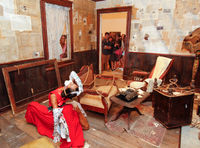Dance
Vesper Contemporary Art Fusion: Questioning Identity with Art, Dance

The fist view of Titus Kaphar’s The Vesper Project at the Lowe Museum of the University of Miami elicits questions: What catastrophe happened here? What awful force created this destruction? The house, with its ornate furniture and gilded frames dangling off the walls, which are covered with peeling newspapers and faded pictures — many of which are whitewashed revealing partial views of the hidden faces beneath — is an enigma. A clock hangs precariously, opened as if someone was about to wind it but stopped. A figure, seemingly long deceased, slumps in a decrepit wheelchair. A book is left abandoned next to a vintage typewriter. Paintings are slashed or whitewashed. Chaos is everywhere in this nightmarish house.
What happened to the inhabitants? What terrible tragedy befell them? It’s all so real, so unnerving. But it isn’t real — it’s a confabulation, false memory masquerading as the truth. Kaphar, a New York City-based artist, has incorporated his own work into the fictional lives of a 19th century family, the Vespers, who are “passing” for white in a time when being mixed meant being black in the eyes of the law.
The story is told through the house and its contents, which can unbalance the viewer with its fragmentation. The work touches upon race, cultural identity, belonging, isolation, homelessness, fear and the power of communities — which can build up or destroy.
Into this house steps (literally) Peter London and dancers, the Peter London Global Dance Company. “It’s a house falling into hell, like an earthquake,” says London. He goes on to explain that in that time and place (New England) “people needed to know who [other ] people were… neighbors wanted to know about each other.”
It was in this hyper-inquisitive community that the Vespers desperately tried to hide their secret. “Relationships were based on keeping that secret. Everything was overdone in order to hide their tracks. [There was] a sense of homelessness…not belonging to a place, losing final power where nothing is real, and living in terror. Living in secret creates an intense psychological and emotional life. The body takes on a different behavior because you are living a lie,” says London.
His choreography is based on this situation; the intrusive neighbors — constantly whispering, spreading the family’s secret, which creates “high intensity and angst,” London explains. He draws on music that would have been played at that time, along with West African drumming, music from the Caribbean and the voices of Maria Callas, Sarah Vaughan and Mahalia Jackson. There is also live jazz by the Burdocks Ensemble.
Kaphar encouraged London to use the interior of the recreated house, which he does – including the inspiration for the designs of the costumes, by Rashidi Lewis. London, a former dancer with the Martha Graham Dance Company, brings to this piece a background rich in the knowledge of Greek mythology. He has taken some of these myths and transformed them into contemporary statements. The Vespers live lives of mental anguish, unable to trust anyone outside of the family. They walk on eggshells and London has his dancers literally moving on eggshells. The Vespers, living in ruins, were also living in a reverse glass house — they saw and lived looking out on all those whocould bring catastrophe upon them. The house became a war zone, and they became its psychological prisoners.
Kaphar’s creation haunts as it compels us to question the reliability of memory andcultural history. His house is akin to a fragmented mind slowly slipping into madness — losing its humanity to a force beyond its reach. Kaphar places a mirror up to our society and London moves it closer.
Vesper Contemporary Art Fusion, Saturday, October 15 at 6:00 p.m., at the Lowe Museum of Art, 1301 Stanford Dr., Coral Gables. Reception to follow; admission $20; $15 for Lowe members; tickets: rsvp.lowemuseum.org; 305-284-5587.
